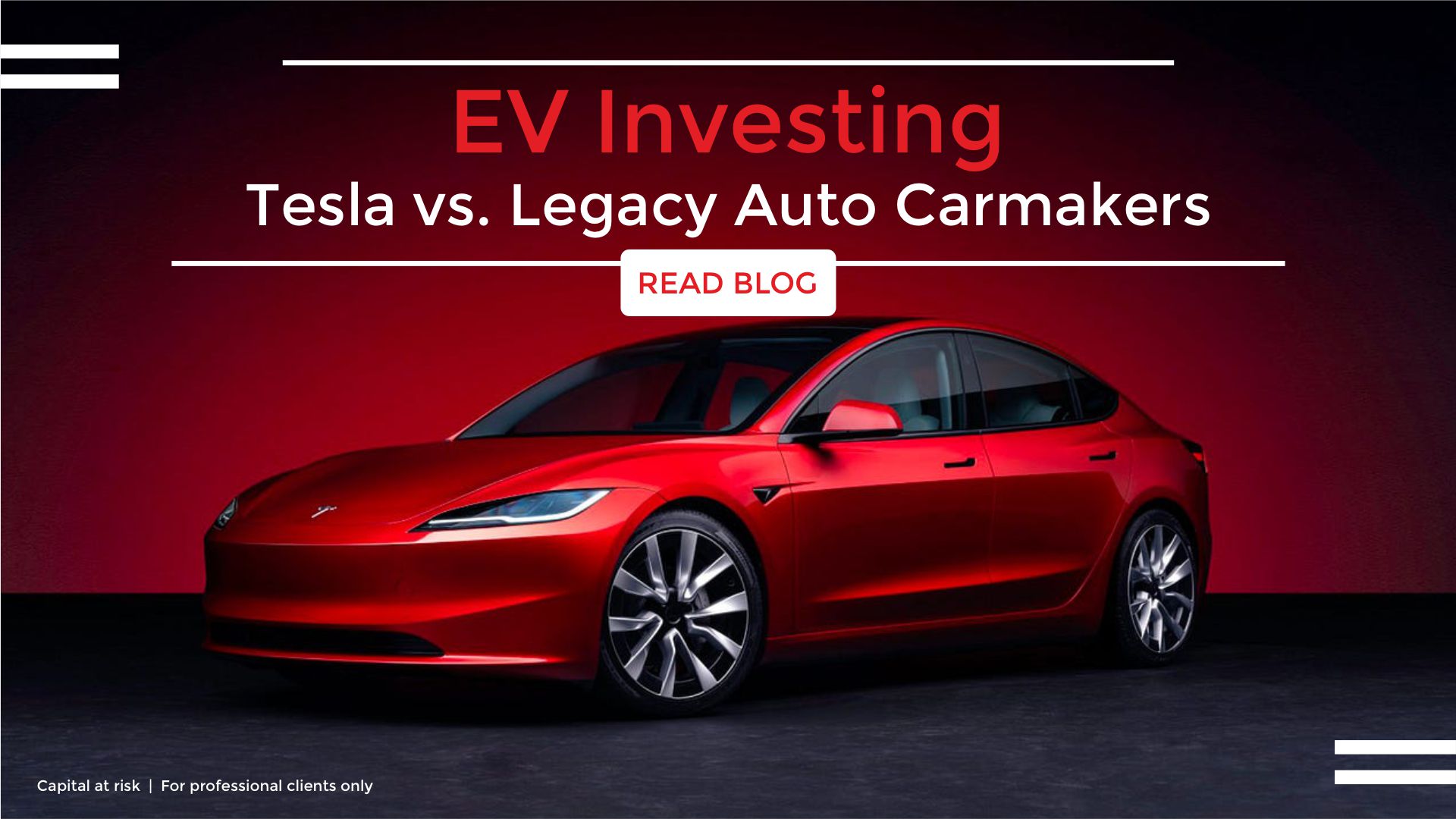EV Investing: Tesla vs. Legacy Auto Carmakers
Posted:
Until half a decade ago, all the legacy car maker companies had ignored the signs of transition to Electrical vehicles (EV). But with countries around the world aiming for zero emission as their end-game, concerns about climate change and a growing awareness of the environmental impact of traditional vehicles have led both consumers and governments to embrace EVs as a cleaner alternative. This has led to unprecedented growth and transformation in the EV industry.
Apart from this, governments around the world are actively promoting EV adoption through a range of incentives, including tax credits, subsidies, and regulatory support. This creates a conducive environment for investors, as government backing enhances the prospects of companies operating in the EV space. Investors can strategically position themselves to benefit from these supportive policies and contribute to a cleaner, more sustainable future.
Tesla's Dominance
Tesla stands as one of the renowned and pioneering entities in the EV industry. Tesla's dominance in the EV industry is evident as it accounts for approximately 61% of all the electric cars sold in the US.
Moreover, Tesla's dominance in the EV industry is rooted in its early entry and consistent commitment to innovation. As one of the first companies to focus exclusively on electric vehicles, Tesla gained a crucial first-mover advantage. This allowed the company to set industry standards and continually push the boundaries of EV technology. Tesla's innovation extends to advancements in battery technology, which has not only improved vehicle range but also positioned Tesla as a leader in energy storage solutions.
Expansive Charging Infrastructure:
Apart from building electric vehicles Tesla's investment in an expansive Supercharger network addresses a critical concern in the EV market charging infrastructure. The widespread availability of Superchargers enhances Tesla's dominance by providing a seamless charging experience for its vehicle owners. This infrastructure significantly reduces range anxiety, a common concern among potential EV buyers, and contributes to Tesla's appeal for long-distance travel. Having an in-house battery plant, energy storage solutions, and solar products positions it as a comprehensive clean energy provider.
Financial Performance
Tesla's financial performance over the years reflects its dominance. The company for Q3FY23 reported total revenue of $23.35 billion compared to $21.454 billion up by 9% YoY. (Source: Graniteshares). The company's consistent revenue growth, positive earnings, and high stock valuation demonstrate investor confidence in Tesla's business model and its ability to navigate the competitive landscape successfully.
In recent years Tesla has undergone various price cuts on their EV vehicles to make it more affordable to transition to EV space. Moreover, the company has announced Cybertruck deliveries are on track for November 30th of this year at Giga Texas Graniteshares). Despite Covid-19, China supply chain issues, and margin issues Elon Musk has led the company to profitability.
Legacy Automakers' Response
Toyota, VW, - Volks Wagen, Ford, and GM - General Motors are having difficulties transitioning from traditional engines to electric drivetrains due to the EV revolution. This revolution has brought about significant changes in the automotive industry, forcing these companies to adapt. As a result, they are facing numerous challenges in making this shift.
The established manufacturing processes, supply chains, and expertise in combustion engine technology present hurdles for traditional automakers in swiftly adapting to the evolving demands of the market. This transition has necessitated significant investments in retooling and retraining, posing a financial and operational challenge for traditional players.
Challenges
Ford CEO Jim Farley in a recent podcast mentioned that the legacy car makers are struggling with the transition to electric vehicles. Also, the capital risk of transitioning to electric has been enormous and from a commercial perspective was not working in line with the company's trajectory.
He also pointed out that another issue with legacy carmakers transitioning to electric is the integration of software into their electric vehicles. He further explained that the problem is that software is developed by 150 different companies, and there is a lack of communication between them.
Despite the vehicle being branded as Ford, he will need approval from Bosch to modify their C control software. Even if he had a high-speed modem in the vehicle and the capability to write software, he would be dealing with 150 distinct software systems in various programming languages.
Investment in Charging Infrastructure:
Legacy automakers are recognizing the importance of a robust charging infrastructure in supporting the adoption of electric vehicles. Some are investing in building charging networks or collaborating with existing charging providers. The development of a comprehensive charging infrastructure is critical for addressing consumer concerns about EV range and accessibility, and legacy automakers are taking steps to contribute to the growth of this infrastructure.
Market Share and Production
Tesla's dominance in electric vehicles (EVs) is evident in its significant market share. The company consistently outpaces legacy automakers in EV sales, securing a notable portion of the global market. Tesla's production capacity is a key contributor to this dominance, with efficient manufacturing processes allowing for high output.
Legacy automakers, while increasing their EV production, often face challenges in matching Tesla's scale. Tesla's ability to produce a substantial number of vehicles and meet growing demand contributes to its market leadership, emphasizing the importance of production efficiency and scalability in the competitive landscape.
Future Outlook
The future outlook for electric vehicles (EVs) suggests continued growth and innovation. Tesla's pioneering role is expected to drive further advancements in battery technology, range, and autonomous features.
Legacy automakers, intensifying their EV efforts, aim to capture a larger market share. Government incentives and evolving consumer preferences are anticipated to bolster the EV market. As the industry evolves, collaborations, improved charging infrastructure, and regulatory support will play pivotal roles. The competitive landscape is poised for dynamic changes, with the potential for new entrants and transformative shifts in how society views and adopts electric mobility solutions.
Tesla ETPs by GraniteShares
Tesla ETPs by GraniteShares
| Product name | Ticker | ||
|---|---|---|---|
| USD | EUR | GBX | |
| 3STS | 3STE | 3STP | |
| 3LTS | 3LTE | 3LTP | |
| 3SFT | 3S3E | 3S3P | |
| 3FTG | 3FTE | 3FTP | |
| FTNG | FTNE | FTNP | |
| SFTG | SFTE | SFTP | |
DISCLAIMER
This is a disclaimer stating that all trading and investing comes with risks. Always do your research and do not invest more than you can afford to spend.
GraniteShares accepts no responsibility for any loss or damage resulting directly or indirectly from the use of this blog or the contents.
This blog does not constitute an offer to buy or sell or a solicitation of an offer to buy securities in any company. Nothing contained herein constitutes investment, legal, tax or other advice nor is to be relied upon in making an investment or other decision. No recommendation is made positive or otherwise, regarding individual securities or investments mentioned herein. Any summary list of risk factors does not purport to be a complete enumeration or explanation of the risks involved in a particular investment. Prospective clients must consult with their own legal, tax and financial advisers before deciding to invest. This email contains the opinions of the author and such opinions are subject to change without notice. The source of data is GraniteShares unless otherwise stated. No guarantee is made to the accuracy of the information provided which has been obtained from sources believed to be reliable. This email and the information contained herein is intended only for the use of persons (or entities they represent) to whom it has been provided. Past performance is not a reliable indicator of future results. The value of an investment may go down as well as up and can result in losses, up to and including a total loss of the amount initially invested. Investments may involve numerous risks including, among others, company risks, general market risks, credit risks, foreign exchange risks, interest rate risks, geopolitical risks and liquidity risks. Please note that GraniteShares short and leveraged Exchange Traded Products are for sophisticated investors.


